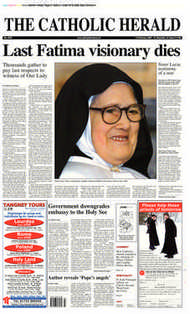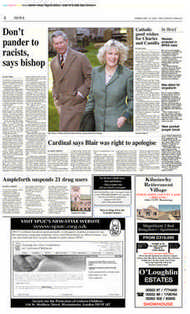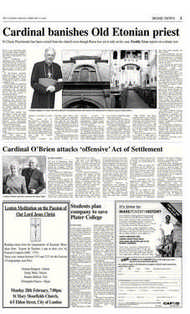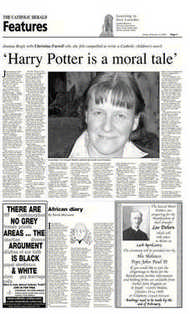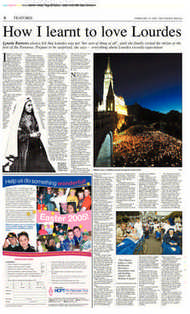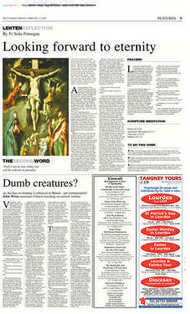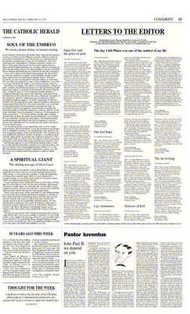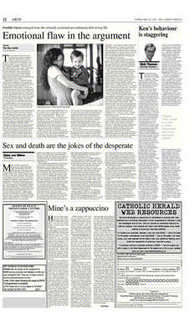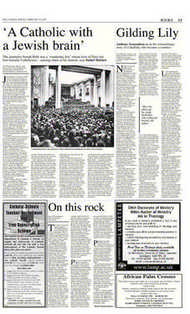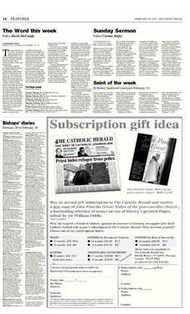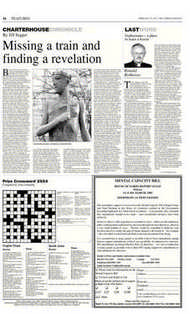Page 10, 18th February 2005
Page 10

Report an error
Noticed an error on this page?If you've noticed an error in this article please click here to report it.
Tags
Share
Related articles
‘duchess Of Cornwall’ Is A Made-up Title
Prince Delays Royal Wedding To Attend Pontiff’s Funeral
Batting For The British Constitution
Charles And Camilla Should Be Forgiven, Not Judged
Why Can’t William Marry A Catholic?
The Prince may have to make a sacrifice
David Twiston Davies
As Catholics, we have no place in the controversy about whether the Prince of Wales and Mrs Parker Bowles should be permitted a church wedding; since the Reformation we have been specifically barred by law from exercising any influence on the Anglican church.
This, of course, does not mean that we have not shared the horror of watching the “fairytale match” between the Prince and his beautiful young bride end up in adultery, divorce and the violent conclusion of a Greek tragedy. Yet, despite the endless gossip, all the circumstances are not known, and never will be.
There was evidence that the couple were ill-suited even before the marriage took place. The Prince is said to have wondered whether the wedding should be called off; and his equivocal reply to the question of whether he was in love suggests that he allowed himself to be pushed by others into marrying. He seems to have warmed to the young Camilla Shand when they met in their 20s, and friends say he was badly shaken when she became engaged to Andrew Parker Bowles while the Prince was serving abroad as a naval officer.
Of course, it can be said that, while the Prince and Mrs Parker Bowles are star-crossed lovers, they should put up with the consequences, as other less important husbands and wives have done in the past, and indeed still do.
But we cannot lay down the law. As Catholics we are, sadly, no more strangers to irretrievable marriage breakdown these days than other groups. We can certainly understand why the Queen felt unable to turn her back on her children when their marriages failed.
A second reason Catholics have no place in this sorry business is that Mr Parker Bowles, a Catholic, was able to obtain an annulment of his marriage to Camilla; so, if his former wife had also been a Catholic, she would now be free to marry in the eyes of the Catholic Church. Nevertheless, as subjects of the Queen concerned for the efficient workings of government, we cannot totally dissociate ourselves from the problem posed by the Prince’s remarriage plans. He is not just any survivor from an unhappy marriage. Although he enjoys great privileges, the Prince is destined to bear heavy obligations as both a member of our first family and as the man who is to become king and supreme governor of the Church of England. Irrespective of his misconduct, his decision to remarry is putting a strain on that church.
However much we abhor the way that church came into existence and are disappointed by its failure to uphold Christian values in recent years, it remains a guarantee that those values remain at the core of our national life. If the Church of England were swept away, the Catholic Church would certainly not be restored to its former position. Whatever replaced it would probably claim to be neutral but in fact be hostile to Christianity, probably with the excuse that Britain must adhere to the equality dictates of the European Union.
The Prince is not as popular as he should be; and the most important reason for this is that he is not seen to be taking the burdens of duty as seriously as his mother does. If he wishes to strengthen the monarchy when he succeeds to the throne, he must be prepared to show that his private wishes do not come first. He may be right in believing that, by the time he is crowned, the public will have grown bored with the controversy over Mrs Parker Bowles’s status – and she may then have been Duchess of Cornwall for several decades.
But there is something unedifying about him depending on that public indifference which could all too easily become lack of concern for the monarchy itself.
The Prince makes sacrifices in his life, many of them far from the public gaze. But, even if he negotiates the constitutional hazards on the way to his wedding service, he may well find that the greatest demonstration of the service he wishes to render as king, will lie in resisting his desire to have his wife crowned beside him.
blog comments powered by Disqus


